God of Sikhism and the Path of the Sikh Gurus
Sikhism is built on a clear and uncompromising belief in one God, understood as eternal, formless, and present in all creation. This understanding of the sikhism god shapes every aspect of Sikh life, from daily prayer to ethical conduct and community responsibility. The Sikh path does not separate God from the world; instead, it teaches that divine presence flows through people, nature, and honest action. From the first guru of sikh tradition to the last sikh guru, Sikh teachings consistently point toward unity, equality, and disciplined living.

DIVINE ONENESS
The Sikh God: One Reality Beyond Form
The sikh god is not imagined as human, distant, or limited by shape. Sikh belief defines God as timeless, without birth or death, beyond fear and hatred. This god of sikh understanding exists everywhere and cannot be confined to images or symbols.
In everyday language, Sikhs often refer to God as Waheguru, meaning a wondrous teacher. This name reflects guidance rather than authority, reminding believers that spiritual growth comes through learning and humility.
Key ideas about the sikh god include:
- God is one and indivisible
- God exists beyond religion and labels
- God is experienced through remembrance and action
इस दृष्टि में ईश्वर कोई अलग सत्ता नहीं, बल्कि जीवन का आधार है।
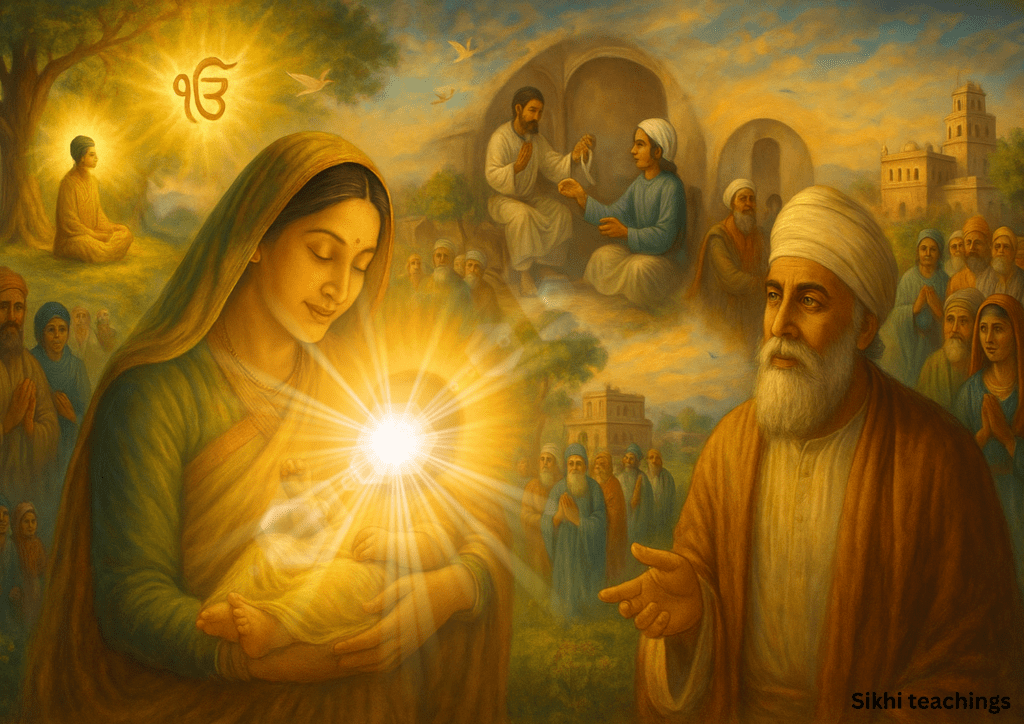
God and Equality
Because the Sikh god is one and universal, Sikhism rejects hierarchy among people. No caste, gender, or background brings someone closer or farther from God. All beings share the same divine source.
This belief forms the ethical backbone of Sikh life and explains why equality is not a social policy, but a spiritual truth.
SHARED REMEMBRANCE
Where Do Sikhs Worship and Remember God
Many ask where do sikhs worship if God is everywhere. The answer is both simple and profound.
The Role of the Gurdwara
Sikhs gather in gurdwaras, which serve as spaces for collective prayer, learning, and service. A gurdwara is not a temple in the traditional sense. It is a place where the Guru’s wisdom is present and shared openly.
Inside a gurdwara:
- The Guru Granth Sahib is placed at the center
- Hymns are sung aloud
- Everyone sits together without separation
The focus is not on the building, but on shared remembrance and humility.

Worship Beyond Walls
Sikh teaching makes clear that worship is not limited to any location. Remembering God through honest work, service, and discipline is equally sacred. A Sikh’s daily life becomes a form of worship.
FOUNDATION OF UNITY
The First Guru of Sikh Tradition: Guru Nanak
The foundation of Sikhism begins with Guru Nanak, the first guru of sikh faith. Born in the Punjab region in the fifteenth century, he introduced a radical spiritual vision rooted in unity and compassion.
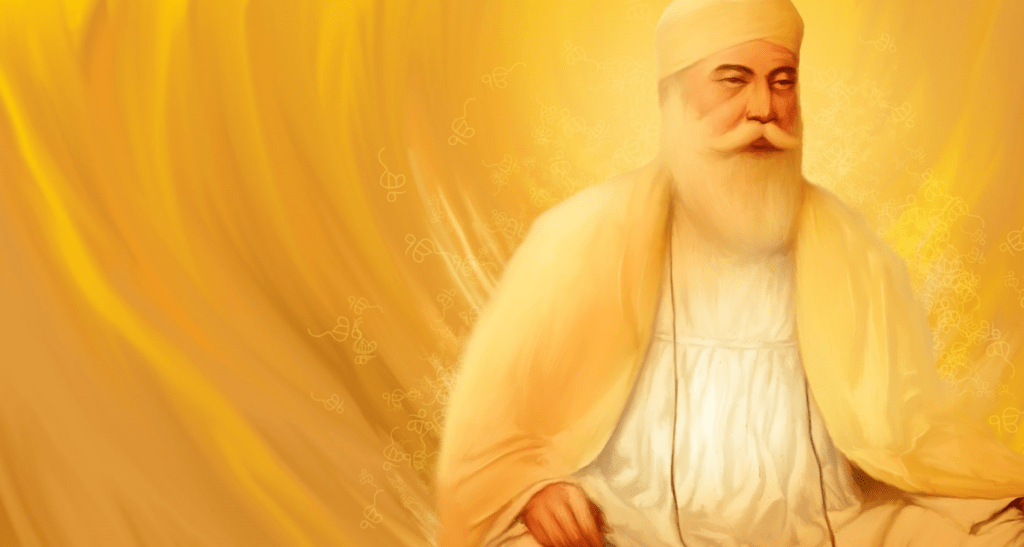
Guru Nanak’s Core Message
Guru Nanak taught that:
- There is one God for all humanity
- Truth is higher than ritual
- Ego separates humans from God
His teachings were often expressed through simple verses and songs, making them accessible to ordinary people. These guru nanak lines were meant to be lived, not memorized.
Ajit Singh Khalsa reflects: गुरु नानक ने धर्म को जीवन से अलग नहीं किया, बल्कि जीवन को ही साधना बना दिया। Guru Nanak did not remove religion from life; he turned life itself into practice.
Who Succeeded Guru Nanak
After Guru Nanak, spiritual leadership passed to Guru Angad. This marked the beginning of a lineage built on merit and devotion rather than inheritance. Each successor preserved the same spiritual light while addressing new challenges.
CONTINUOUS WISDOM
How Many Gurus Are There in Sikhism
A common question is how many gurus are there in sikhism. Sikh tradition recognizes ten human gurus, each contributing to the development of the faith.
The Purpose of the Gurus
Each guru strengthened Sikh values such as:
- Devotion to one God
- Justice and courage
- Community responsibility
They guided Sikhs through spiritual, social, and political challenges without altering the core belief in unity.
The Line of Sikh Gurus
The all guru name lineage includes:
- Guru Nanak Dev Ji
- Guru Angad Dev Ji
- Guru Amar Das Ji
- Guru Ram Das Ji
- Guru Arjan Dev Ji
- Guru Hargobind Ji
- Guru Har Rai Ji
- Guru Harkrishan Ji
- Guru Tegh Bahadur Ji
- Guru Gobind Singh Ji
These names are often referred to collectively as all sikh guru name or all sikh gurus name, emphasizing continuity rather than individual authority.



BEYOND HUMAN
The Last Sikh Guru and the Eternal Guru
Guru Gobind Singh, the last guru of sikh in human form, transformed Sikh leadership permanently.
Who Was the Last Sikh Guru
Guru Gobind Singh declared that after him, no human guru would follow. Instead, authority would rest in the Guru Granth Sahib, making it the eternal guide for Sikhs.
This decision ensured that:
- No individual could claim spiritual dominance
- Teachings would remain accessible to all
- The Sikh path would stay rooted in wisdom, not power
This transition answers both who was the last sikh guru and why Sikhism follows scripture as living guidance.
GUIDED BY SHABAD
Guru Granth Sahib Teachings and Daily Life
The Guru Granth Sahib is more than a holy book. It is treated as a living guru whose teachings guide thought and action.
How Sikhs Engage with Scripture
The verses are written in poetic form and meant to be sung. Singing connects emotion, memory, and meaning, allowing teachings to enter daily life naturally.
Guru Granth Sahib teachings emphasize:
- Humility over ego
- Remembrance over distraction
- Service over self-interest
This approach makes spirituality practical rather than abstract.
DAILY REFLECTION
A Question to Reflect On
If the Sikh god is present everywhere, how should a person speak, work, and treat others each day?
This question sits at the heart of Sikh teaching and challenges believers to align belief with behavior.Guru Nanak’s sayings are not ancient words lost in time — they are still sung, lived, and meditated upon daily.
CORE PRINCIPLES
The Three Pillars of Sikhism
Guru Nanak established three core pillars that continue to shape Sikh life across generations. These principles offer a clear guide to spiritual integrity and social harmony.

Naam Japna – Remembering the Divine
Sikhs are encouraged to repeat and meditate on God’s name throughout the day. This practice, known as naam japna, brings awareness of Waheguru into every action.
Naam japna helps clear the mind, reduce ego, and ground one’s identity not in pride, but in humility. It reminds the Sikh that the divine presence flows through all things.
Kirat Karo – Honest Living
Kirat karo means earning a living through hard work, honesty, and fairness. This teaching rejects corruption, deceit, or exploitation.
For Sikhs, work is not just economic — it is a form of worship. Earning through truth is equal to prayer if done with sincerity and integrity.
Vand Chhako – Sharing with Others
Vand chhako means sharing what one earns and ensuring others are cared for. It encourages Sikhs to serve those in need, feed the hungry, and participate in the community.
This principle is lived through the langar — the free community kitchen — where anyone, regardless of religion or status, can eat with dignity.
SPIRITUAL ALERT
Maya and the Five Thieves
Sikhism teaches that the material world — called Maya — is temporary and can distract from spiritual purpose. The greatest threats to the soul are known as the Five Thieves.
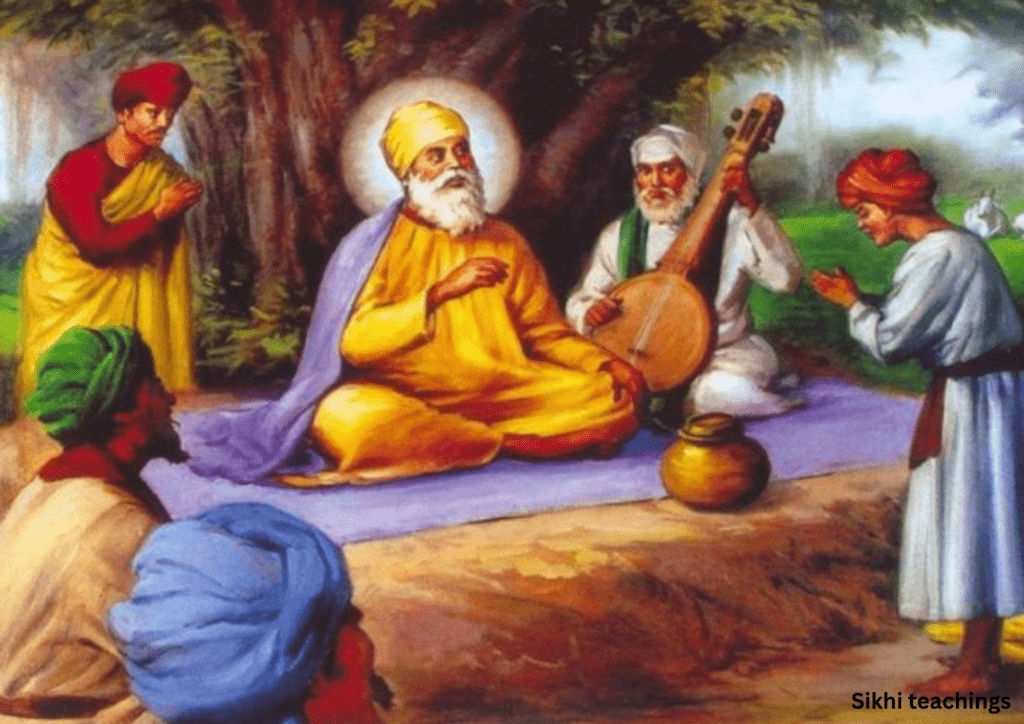
The Five Thieves
- Ego (Ahankar) – Pride that separates the self from others
- Anger (Krodh) – Emotional reaction that clouds truth
- Greed (Lobh) – Desire for more than needed
- Attachment (Moh) – Clinging to people or things out of insecurity
- Lust (Kaam) – Impulse that disturbs clarity and balance
These qualities rob a person of inner peace and block the soul from connecting with the sikhism god.
Overcoming the Thieves
To overcome these, Sikhs turn to:
- Daily prayer
- Seva (selfless service)
- Community discipline
- Reflection on the Guru’s teachings
By confronting the thieves, one moves toward the light of Waheguru and away from illusion.
SOUL’S PATH
What Sikhs Believe About Life, Death, and Rebirth
Sikhism teaches that the human body is temporary, but the soul is eternal. The physical world is only one stage in the soul’s journey toward the Divine.
The Soul’s Journey
The soul is seen as a drop of divine essence, returning again and again through birth and death until it merges back with the Creator.
Reincarnation is not a punishment — it’s a path. Each life is a chance to learn, serve, and move closer to the divine truth.
Death in Sikh Thought
Death is neither feared nor celebrated with rituals. It is accepted as natural. Mourning is balanced with prayer, reflection, and the singing of hymns to remember the eternal soul.
Ajit Singh Khalsa reflects: मृत्यु के बाद जीवन समाप्त नहीं होता — बस आत्मा एक नए पड़ाव पर जाती है।
After death, life does not end — the soul simply moves to its next stage.
PATH OF LEARNING
The Meaning of Sikh in Punjabi and Global Life
The word Sikh means student or learner. A Sikh is someone committed to learning the truth, living with discipline, and walking the path set by the Gurus.
The Sikh identity includes:
- Unshorn hair wrapped in a turban
- A steel bracelet (kara) symbolizing unity
- A small sword (kirpan) representing duty and courage
But beyond symbols, a Sikh’s purpose is to live with truth, protect the vulnerable, and see god in all.
Sikh World Today
Sikhs today are found in every part of the world. Despite migration and change, the values of the Sikh guru name tradition remain strong. From local gurdwaras to global humanitarian work, the community reflects the timeless light of the ten gurus and the wisdom of the eternal Guru Granth Sahib.
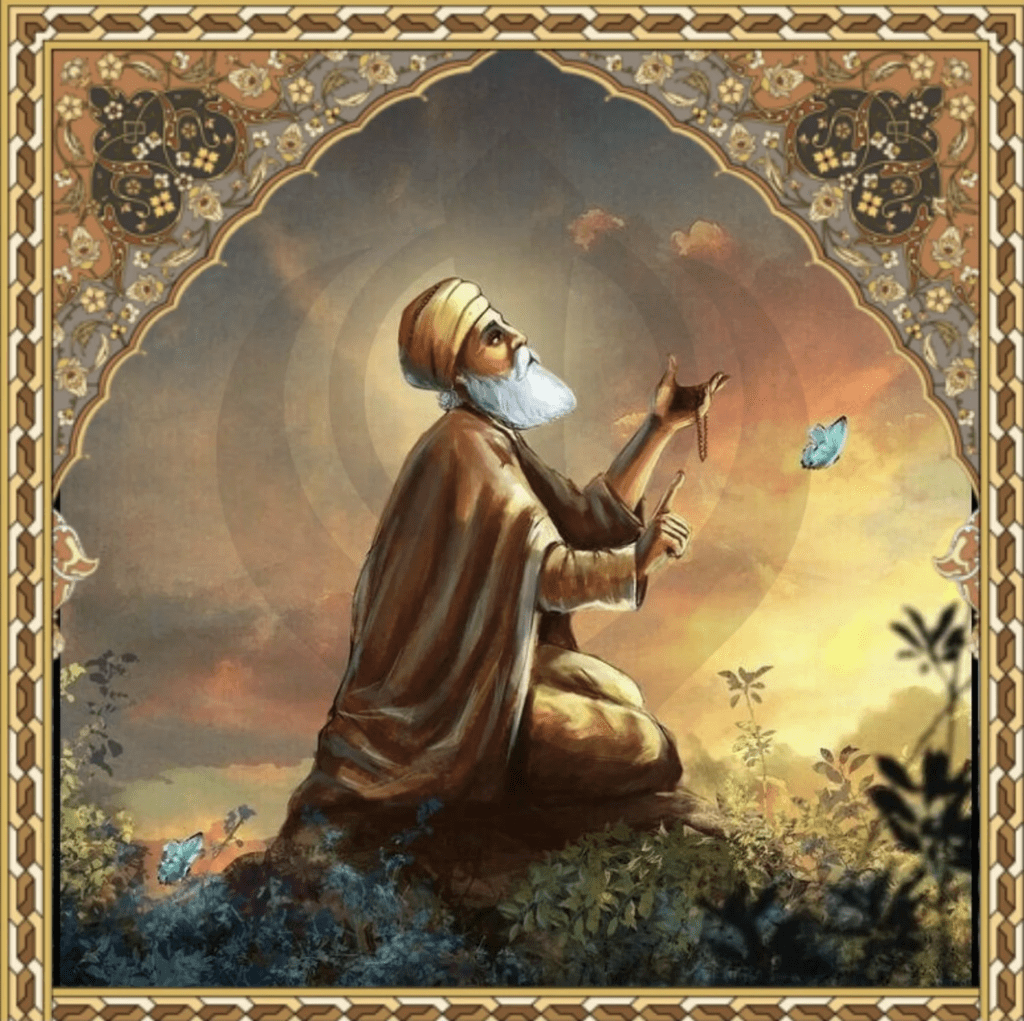
Core Teachings and Terms in Sikhism
| Concept | Meaning |
| Sikh God Name | Waheguru |
| First Guru of Sikh | Guru Nanak Dev Ji |
| Last Sikh Guru | Guru Gobind Singh Ji |
| Eternal Guru | Guru Granth Sahib |
| Worship Place | Gurdwara |
| Three Pillars | Naam Japna, Kirat Karo, Vand Chhako |
| Five Thieves | Ego, Anger, Greed, Attachment, Lust |
| Maya | Illusion of material world |
| Japna Meaning in English | Repetition or remembrance of God’s name |
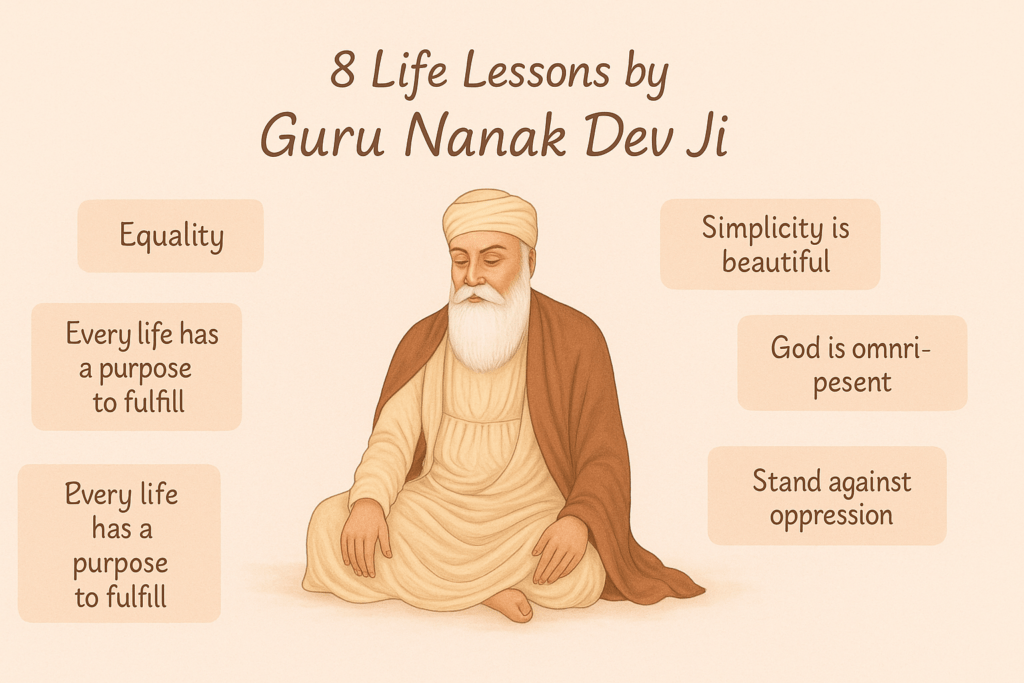
INNER DEVOTION
Why the Sikh Book Rejects Superstition and Ritual
Guru Nanak’s teachings mark a clear shift from form to essence.
Against Blind Ritual
He condemned:
- Wearing sacred threads as social symbols
- Pilgrimages done for status
- Worship that excludes action
He asked: क्या भगवान को तुम्हारे पहनावे और जाति की ज़रूरत है?
Internal Devotion
Instead of outer show, Guru Nanak emphasized:
- Simran (remembrance of God)
- Seva (service to others)
- Sat (truthfulness)
This is why Sikhism has no fasting, idol worship, or exclusive rituals. The sacred book keeps this principle alive.
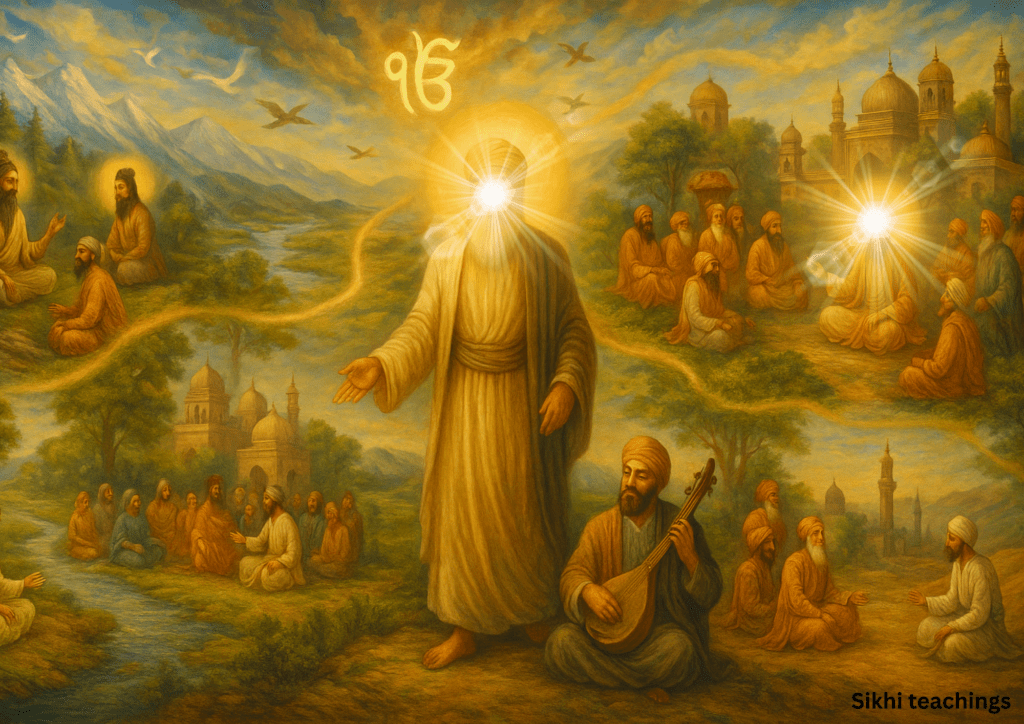
LIVED WISDOM
What Would the Gurus Want From Us Today?
Would they want rituals or righteousness? Appearance or awareness?
The answer lies in their lives:
- They lived humbly
- They served boldly
- They taught simply
Every Sikh, regardless of age or place, carries the light of all gurus name within them. To walk the path of the Gurus is not to follow rules — it is to live with clarity, compassion, and commitment.
